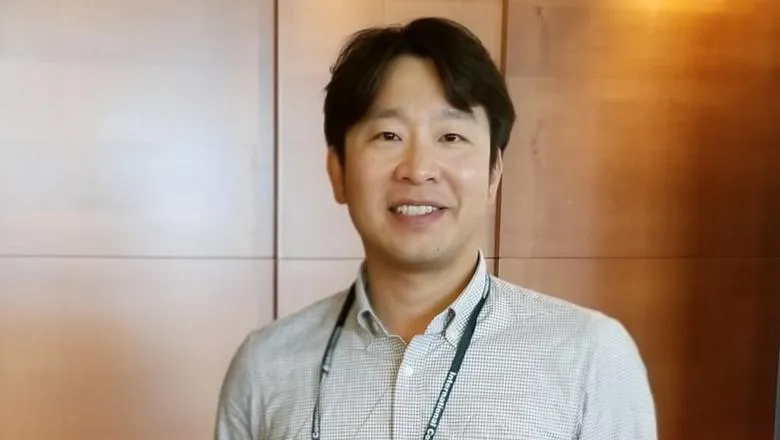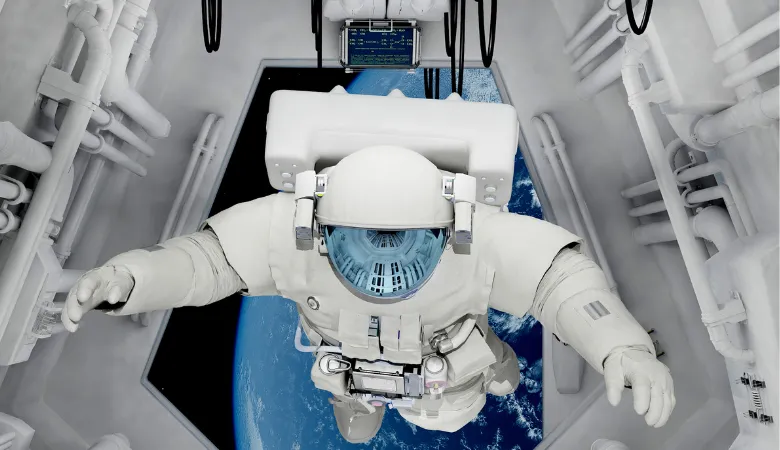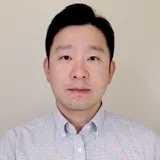It’s a huge honour to receive this fellowship. It’s a really good opportunity for my career and aligns well with the Centre’s objectives.”
20 June 2025
Winning the Leverhulme Early Career Fellowship Award: An interview with Dr Byungdoo Kim
Rosie Clemo, Communications and Engagement Lead at the Centre for Sustainable Business
We sit down with Dr Byungdoo Kim to discuss winning the Leverhulme Early Career Fellowship Award, how he became interested in sustainable consumption, and why he thinks there's something to learn from the way astronauts live on a space station.

Dr Byungdoo Kim is an early career researcher at the Centre for Sustainable Business.
He recently won the Leverhulme Early Career Fellowship, a prestigious grant that will help fund his research on sustainable consumption for the next three years at King’s Business School.
I sit down to interview Dr Byungdoo Kim in the open-plan office at the Centre, and very soon, the air is filled with laughter between us. It becomes quickly apparent that Byungdoo’s humility lends his answers to the slightly shorter side.
After plenty of coffee, and a few curious looks from our colleagues, Byungdoo shares his research journey into sustainable consumption, and how it led to his application for the Leverhulme Early Career Fellowship grant.
![The Centre for Sustainable Business team. [Left to right: Ai-Peri Dzhumashalieva, Thora Frost, Siavash Alimadadi, Jonatan Pinkse, Laura J Spence, Paula Jazarbkowski, Catherine Tilley and Byungdoo Kim.]](/ImportedImages/Schools/Business/research-groups-centres-images/csb/csb-team-with-dr-byungdoo-kim.x456b4179.jpg?w=780&h=585&crop=780,440,0,108&f=webp)
Dr Byungdoo Kim originally studied British and American Culture in South Korea. His first job was on a road construction site, which opened his eyes to the inevitable environmental impacts that come with building essential infrastructure. “We used explosives to obliterate entire hills,” Byungdoo recalls. “There were tiny animals and a whole ecosystem living there, and it was suddenly gone. I believed in nature’s resilience, but to be honest, I was very shocked.”
The experience led Byungdoo to ask deeper questions on the way we live, chiefly, “Why do we always have to make, buy, consume and then throw away?”. He went on to study a Master’s in Environmental Planning, where he realised how powerful communication can be as a tool to change people’s behaviour. He followed his theory and completed a PhD in Communication, with a focus on Science, Health, Environment and Risk.
“My PhD research focused on how people perceive environmental impacts, risks, and interventions and how those perceptions influence their decisions.” Byungdoo explains, “I’ve found, for example, that even environmentally conscious individuals often underestimate the impact of eco-friendly products, which can lead to misinformed choices.”
Byungdoo won the Leverhulme Early Career Fellowship Award to explore his research on this further. His project, titled; ‘When green marketing backfires: Lifecycle thinking for scope insensitivity’, will analyse what happens when well-intentioned ‘green’ marketing unintentionally causes more consumption, not less. “I want to focus on how consumers’ underestimation of the ecological impact of green products results in rebound effects,” Byungdoo says, “Where the gains from the product being ‘green’ are then offset by the increase in production or use. There is evidence emerging in areas like energy and clothing, but the research is still fragmented.”
The Leverhulme Trust is an independent charity that funds blue-skies research which has the potential to generate new ideas and research breakthroughs that benefit society. This three-year fellowship offers support through partial salary funding, as well as giving an annual allowance for data collection activities, such as experiments, focus groups, and conference expenses. “It’s a huge honour to receive this fellowship,” Byungdoo admits, “It’s a really good opportunity for my career and aligns well with the Centre’s objectives.”
Byungdoo joined the Centre for Sustainable Business in August 2024, working with Dr Matteo Montecchi on a range of projects that explore his interest in sustainable consumption behaviour, and how we can encourage more people to live more frugally. “I often think we should pretend we’re astronauts,” he says, ignoring my slightly confused expression, “As if we’re all living on a space station with limited supplies and have to find creative solutions to make do with whatever we already have.”
Live like astronauts: reframing the narrative in this way could help to encourage more people to imagine they’re living on finite resources. This is Byungdoo’s point – rather than buying greener or sustainable-labelled products, we should rethink if we need to buy it at all. “Shop with intention, not abandon.” He advises, “And try to see ‘making do’ as a fun challenge.” However, he is the first to admit of its difficulty. “I think often about this paradox. We all live hypocritical lives – here I’m saying we must be mindful, but it’s so hard to put into practice when societal, familial, or internal pressures come into play.”

I often think we should pretend we’re astronauts, as if we’re all living on a space station with limited supplies and have to find creative solutions to make do with whatever we already have.”
Naturally, this asks the bigger question of how businesses will respond to this shift in consumer behaviour. “They won’t like it,” Byungdoo says, “But I do see many businesses starting to take initiative, focusing more on product life cycles and fixing what they’ve already sold. As consumers, we can help accelerate this shift.”
Looking ahead, Byungdoo hopes his research will help a wide range of people to make a positive impact on consumption behaviour. “This research could help marketers better understand and address overconsumption, including the excessive consumption of 'sustainable' products, while also offering psychologists insight into how easily consumers can misinterpret them. I also hope it provides environmental scientists and policymakers with practical tools to communicate environmental impact more clearly."
Having never applied for a large grant before, Byungdoo started working on his first draft for the Leverhulme Fellowship in November 2024. He emphasises how important it was to have the support of his mentor, Dr Matteo Montecchi, as well as Professor Jonatan Pinkse, Centre Director, and Sarah Evans, Research Development Manager, in completing the application.
Any advice for other young researchers? “If you’re thinking about applying for Leverhulme, just give it a shot. Be bold and ambitious.” He smiles, “I didn’t think I’d get this one. Best advice I got was to write a really good hook in the beginning of the application. I struggled with that for a long time, but Jonatan and Matteo really helped. Having supportive people around you is key.”
I used to think sustainable consumption was all about personal responsibility—not entirely wrong, but that was naïve. Working alongside researchers at the Centre who are focusing on different sustainability themes, I realise it’s way bigger."
We talk a little more about his experience at the Centre for Sustainable Business, which, he says, has been eye-opening. “I used to think sustainable consumption was all about personal responsibility – not entirely wrong, but that was naïve. Working alongside researchers at the Centre who are focusing on different sustainability themes, I realise it’s way bigger. Individual behaviour is deeply interconnected with business goals.”
Is that a relief to discover? “Yes,” he laughs. “I always thought that businesses just wanted to sell more. But it’s not the case. There are many advocates within businesses actively looking to help shift the balance.”
It’s clear that Byungdoo is eager to get back to his research, and after a polite exchange, he heads back to his favourite desk in the corner. Like all good things in academia, we will have to wait at least three years before his findings emerge, but one thing is for certain: Dr Byungdoo Kim’s research is one to watch.
*
Dr Byungdoo Kim is a Research Associate at the Centre for Sustainable Business at King's Business School. His research focuses on how consumers understand sustainability and implement this understanding in their daily choices and behaviour. Read his full profile here.
*
This article was brought to you by the Centre for Sustainable Business. Find out more about their work here.

